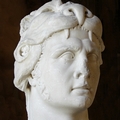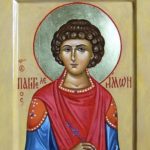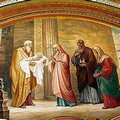
Titus Livius (64/59 B.C. – 12/17 A.D.) was sixteen / eleven years old[1], when a hand of the traitor broke the life of Gnaeus Pompeius Magnus[2]. His memory and the glory of the Free Roman State were the source for Livian creativity. The ab urbe condita libri of Livy were already an encyclopedia of the Roman history for his contemporaries and for his successors[3]. As Sir Ronald Syme showed, Livy recounted an ancient history of Rome as an orator and at the same time he believed that the bloody events of the modernity were more interesting to his readers[4]. Livy wrote about them: “et legentium plerisque haud dubito quin primae origines proximaque originibus minus praebitura uoluptatis sint festinantibus ad haec noua quibus iam pridem praeualentis populi uires se ipsae conficiunt” [I have very little doubt, too, that for the majority of my readers the earliest times and those immediately succeeding will possess little attraction; they will hurry on to these modern days in which the might of a long paramount nation is wasted by internal decay][5].
The Civil Wars of I century B.C. were the unprecedented cataclysm which changed the Roman society. There was a revolution, which was described also by Sir Ronald Syme: “Five Civil Wars and more in twenty years drained the life-blood of Rome and involved the whole world in strife and anarchy”[6]. Livy recounted the history of the Civil Wars in detail, but it is lost with 75 percent of the Livian work. Nevertheless, I can note that Pompey’s figure took the central place of this history. It is well known that Augustus called Livy a “pompeian”, because he extolled Pompey, however it was not an obstacle for their friendship, and Livy allowed himself to praise the pompeians: Scipio and Afranius and even the Caesar’s murderers – Cassius and Brutus[7]. Besides, Livy asked a question: would it be better for the Roman State if Caesar or had no been born?[8]
The Periochae, which remained from the lost books of Livy’s work, allow presenting a structure of his history about the Civil Wars and Gnaeus Pompeius Magnus. The analysis of other sources, which depend or do not depend on Livy help to formulate some general ideas of Livy, connected with the image of Pompey.
The Periochae of the lost “revolutionnaries” books
Livy began his narration about the new era of the Civil Wars with the story of Liuius Drusus and with the beginning of the bellum sociale – the allied war. Then he stated the history of the war between Caius Marius and Cornelius Sulla. He recounted the history of the dictatorship of Cornelius Sulla and of the political elevation of Gnaeus Pompeius. The Civil War between Pompeius and Caesar was a culmination of Pompey’s life. Pompeius suffered a defeat and he was killed. Livy began the story of the dictatorship of Caesar, his murder and the subsequent civil wars, which nominated young Octavian.
Libri LXXI – XC; the Roman history from the action of Liuius Drusus and the beginning of the bellum sociale to the Sulla’s death (91 – 78 B.C.)
Libri XC – CVIII ; the history of Gnaeus Pompeius from the war between Gnaeus Pompeius and Quintus Sertorius to the principate of Pompeius and to the dispute on Caesar’s successor in Gallia (78 – 52/51 B.C.)
Libri CIX – CXVI; the history of the Civil Wars (as it is mentioned in the manuscript tradition) – from the beginning of the war between Gnaeus Pompeius and Iulius Caesar to the murder of Caesar (49 – 44 b.C.). Livy had described the Pompey’s death in the book CXII.
Libri CXVII – CXXXIII; the history of Octavian from the war of Mutina to the war of Actium (44 – 31 b.C.)
The political distempers proceeded sixty years, Livy devoted them sixty books of the Roman history ab urbe condita which were written between 27- 9 B.C. after the instauration of the Respublica by Octavian. The figure of Pompeius Magnus took a central place in this history.
Livy and other sources
The historical works of Lucius Cornelius Sisenna, Sallustius Crispus, Asinius Pollio, Titus Labienus could be a good basis for the Livy’s history of Pompey. The followers of Caesar, Sallustius and Pollio, were counterbalanced by the sympathies of Livy himself. Livy had an opportunity to write the history of Pompey being guided by the testimonies of the direct participants of the Civil War 49-46 A.D. If the information of Sallustius was important for the events of the Sertorian war and for the campaign of Lucullus against Mithridate of Pont, then the Commentary of Pollio – a caesarian who tried to follow an objective statement of the events, – was very important for the history of the war between Pompey and Caesar[9]. Could Livy have used the History of Pompey, which had been written by Poseidonios and the Res Gestae of Pompey written by his Greek friend – Theophanes of Mytilene? The Greek historian and geographer Strabo who was a contemporary of Livy knew these works[10], but the question remains without an answer, because the necessary part of Livy’s work is lost.
The manuscript tradition of the Periochae calls a bellum ciuile only the events of the war between Pompey and Caesar (libri CIX — CXVI). Sallustius and Tacitus perceived these bloody events as a period of total disintegration of the whole system of the Roman law[11]. But the political biography of Gnaeus Pompeius who was a symbol of the Old Rome for Livy and for others “pompeians” of the Roman historical culture: Titus Labienus, Cremutius Cordus, Marcus Anneus Lucanus, tried to look into the origins of the military activity of his father, Pompeius Strabo, – the events of the bellum sociale and the perception of this war by the Roman historical tradition. The revolt of the italici which had been provoked by the murder of Liuius Drusus originally aimed to achieve the Roman citizenship. Further, it began to gain the nature of the fight for a national release[12]. Livy who used probably the History of Lucius Cornelius Sisenna provides the list of the insurgent peoples[13]. This list of Livy is smaller than the information of Appian who could use also other sources, for example the History of Poseidonios[14]. The Roman Historians who used the work of Livy directly: Velleius Paterculus, Florus, Eutropius, gave the impressive characteristics of the war. These characteristics could have been be made by Livy himself[15]. They allow to extend the chronological boundaries post quem of the “Roman Revolution” to 91 year b.C. The bellum sociale was the most destructive in the history of Rome for the Roman historical tradition. It was the first civil war of the oppressed population[16].
After the bellum sociale the new civil war between Caius Marius and Cornelius Sulla obsessed the Roman Republic. The Periocha of Livy’s book LXXXV told: “Cn. Pompeius Cn.Pompei eius qui Asculum ceperat filius conscripto uoluntariorum exercitu cum tribus legionibus ad Syllam uenerat ad quem se nobilitas omnis conferebat, ita ut deserta urbe ad castra ueniretur” [Gnaeus Pompeius (the son of the Gnaeus Pompeius who captured Asculum) conscripted a three-legion army of volunteers and went to Sulla, to whom all leading men of Rome made their way as well, and because of this going to the camp the city seemed abandoned][17]. The career of Gnaeus Pompeius began at this bloody time.
Pompey of Livy
76 B.C. – “Cn. Pompeius cum adhuc eques Romanus esset cum imperio proconsulari aduersus Sertorium missus est” [Although Gnaeus Pompeius was still a Roman knight, he was sent out against Sertorius with the powers of a proconsul][18], wrote Livy. The senate had already sent him against cowardly Gnaeus Papirius Carbo in Sicilia[19], but now his enemy, Quintus Sertorius, was one of the best Roman generals. The fragment of the XCI book of Livy, which had been remained in the palimpsest Vaticanus Palatinus lat. 24, contains five mentions of Pompey. It concerns the events of the Sertorian war in Spain (75 b.C.). The precious fragment recounted the history of the military operations of Sertorius against Pompey after the defeat of Pompey by Sertorius in the battle of Lauron, but before the Pompey’s victory of Valentia over the generals of Sertorius: Marcus Perperna and Gaius Herennius[20]: “[Sertorius] dimisso deinde conuentu iussique omnibus <bono animo esse atque> in ciuitates re<dire> suas principio ueris M. Perpernam cum uiginti milibus peditum, equitibus mille quingentis in Ilercaonum gentem misit ad tuendam regionis eius maritimam oram datis praeceptis quibus itineribus duceret ad defendendas socias urbes quas Pompeius oppugnaret quibusque ipsum agmen Pompei ex insidiis adgrederetur…” [Although then Sertorius lets the council go and commands all the loyal supporters to stay in good health and early to return to their cities, he sent Marcus Perperna with twenty thousand soldiers of the infantry and one thousand five hundred of the cavalry to the people of Ilercaon for protecting the sea coast of this region. Sertorius ordered what roads he would lead the army for defending the towns of the allies, which Pompey attacked and from what ambush the army of Pompey would attack…][21].
The Sertorian war was very difficult for Pompey[22]. Only the death of Sertorius who was killed by his generals, Marcus Perperna and Marcus Antonius, permitted Pompey to finish this war. The figure of Pompey had occupied the central place of Livy’s narration after the XCVII book, when Livy began the history of his political power. Pompey was elected a consul with Marcus Crassus before the quaestura. They restituted the power of the tribuni plebis abolished by Cornelius Sulla (70 b.C.)[23]. After this event, Livy mentioned Pompey in the XCIX book, where he described the beginning of the war of Pompey against the pirates and the history of the conflict between Pompey and Quintus Metellus in Crete[24].
Livy about Pompey and Mithridates
In the C book Livy recounted the beginning of the war of Pompey against Mithridates Eupator (120-63 BC), the King of Pont. Pompey had concluded the pact with Phraates III (70-53 BC), the King of Parthians, and he had defeated Mithridates in the equestrian battle[25]. Mithridates, who had lost another nighttime battle, fled to Bosporus. Pompey began to persecute him. He got a victory over the peoples of the Southern Caucasus: the Hiberi and Albani, which made an obstacle for the marsh of Pompey’s army[26].
I believe also that the fragment of Livy, which speaks about the Alliance or the Union between Pompey and the Parthian King Phraates III (70-57 BC) and about the victory of Pompey over Mithridates Eupator in equestrian combat, could indicate the possible presence in the Roman army of Pompey the units of Parthian heavy cavalry[27]. This argument is based on the understanding that only Parthian heavy cavalry could stand up to Armenian heavy cavalry at this time, which was in the army of Mithridates Eupator.
After the victory over Mithridates Pompey transformed Pont in a Roman province and he conquered Jerusalem, conserving the temple of Jerusalem intact[28]. The Commenta Bernensia ad Lucanum (IV century A.D), which was the precious source for the history of the Civil War (49-46 b. C.)[29], had saved the fragment of the authentical text from the CI book of Livy about the Jews: “Liuius de Iudaeis: Hierosolymis fanum cuius deorum sit non nominant neque ullum sibi simulacrum est neque enim esse dei figuram putant” [Livy about the Jews: Jews don’t speak to whom from gods the Jerusalem sanctuary is devoted. There are no images, and Jews believe that God has no image.][30]. Could Livy have taken this information about the Jewish religion also from the Res Gestae of Pompey written by Theophanes of Mytilene?
In the CIII book, Livy recounted a long history of the political struggle at Rome around the conspiracy for the formation of the first triumvirate[31]. It is very probable that the expression of an actor of the Periocha had remained the authentical words of Livy critically regarding Iulius Caesar: “eoque consulatus candidate et captante rem publicam inuadere conspiratio facta est” [When he was a candidate for the consulship and wanted to seize control of the Republic, a conspiracy was concluded]. Livy did not describe the events of the first triumvirate after 60 b. C. with accuracy. He recounted the history of the military campaigns of Caesar in Gallia and he mentioned the return of Milo from his exile, the acceptance of the cura annonae by Pompey, the lex Trebonia, and the death of Julia, the daughter of Caesar and the wife of Pompey[32]. In the CVII book, Livy mentioned the events, which had precipitated the third consulate of Pompey and his principate. The Periocha give the reasons to suppose that this narration of Livy was favorable regarding Pompey despite his personal republican position[33].
Livy about Pompey in the Civil War
The history of the Great Civil War between Pompey and Caesar was a particular part of Livy’s work. The Periocha of the CIX book says: “qui est ciuilis belli primus” [which is the first dealing with the civil war]. It is evident that Livy had explained the reasons of the war more deeply than the particularities of the personal life of Pompey or Caesar. The events of the civil war are well known directly from the Commentary of Caesar himself and from Asinius Pollio whose Commentary had been used by Suetonius in the Caesar’s Biography and by Appian in the II-III books of his Bella Ciuilia. The lost narration of Livy which had been based on the Commentary of Caesar and probably on the Commentary of Pollio, had been used by Lucanus in his Pharsalia, by Plutarch in the Biographies of Pompey, Cato and Caesar, and by the actors of the historical abbreviations: Velleius Paterculus, Florus, Eutropius, Iulius Obsequens, Orosius and Cassiodorus. The analysis of the Periochae of the books de bello ciuili (CIX-CXVI) shows that Livy followed the Commentary of Caesar and the image of Pompey does not take the first place in this history. It is possible to make the synopsis of the most important events illustrating the life of Pompey during the civil war in the order of the Livy’s narration[34].
The Periocha of the CIX book qui est de bello ciuili primus recounted: “Causae ciuilium armorum et initia referuntur contentionesque de successore C. Caesari mittendo, cum se dimissurum exercitus negaret nisi a Pompeio dimitterentur. Et C. Curionis tribuni plebis primum aduersus Caesarem, dein pro Caesare actiones continet. Cum senatus consultum factum esset ut successor Caesari mitteretur, M. Antonio et Q. Cassio tribunis plebis quoniam intercessionibus id senatus consultum impediebant, urbe pulsis mandatumque a senatu consulibus et Cn. Pompeio, ut uiderent nequid res publica detrimenti caperet. C. Caesar bello inimicos persecuturus cum exercitu in Italiam uenit, Corfinium cum L. Domitio et P. Lentulo cepit eosque dimisit, Cn. Pompeium ceterosque partium eius Italia expulit” [The causes and the beginning of the civil war are described, alongside with the conflict about sending out a successor to Gaius Caesar, who refused to disband his armies unless Pompey disbanded his. It also contains an account of the actions of the tribune of the plebs Gaius Curio, who was first against Caesar, but later supported his case. When the Senate had decided that Caesar was to be replaced, the tribunes Marc Antony and Quintus Cassius, who tried to obstruct the senatorial decision, were expelled from the city. The consuls and Gnaeus Pompey received special powers from the Senate, to see to it that no harm befell the republic. Gaius Caesar entered Italy with an army to wage war against his enemies. He captured Corfinium together with Lucius Domitius and Publius Lentulus, set them free, and expelled Gnaeus Pompey and the other members of his faction from Italy][35].
Iulius Obsequens talked about the terrible signs in the beginning of the civil war following Livy[36]. Paulus Orosius quoted Livy when he talked about the crossing of Rubicon by Caesar[37]. An actor of the scholia of Leiden on the “Pro Ligario” of Cicero wrote that Livy narrated about Tubero’s and Pansa’s accession to Pompey when Curio went to Africa[38].
The Periocha of the CX book of Livy narrated “C. Caesar Massiliam, quae portas cluserat, obsedit et relictis in obsidione urbis eius legatis C. Trebonio et D. Bruto profectus in Hispaniam L. Afranium et M. Petreium, legatus Cn. Pompei, cum VII legionibus ad Ilerdam in deditionem accepit omnesque incolumes dimisit, Varrone quoque, legato Pompei, cum exercitu in potestatem suam redacto. Gaditanis ciuitatem dedit. Massilienses duobus naualibus proeliis uicti post longam obsidionem potestati Caesaris se permiserunt. C. Antonius, legatus Caesaris, male aduersus Pompeianos in Illyrico rebus gestis captus est. In quo bello Opitergini transpadani, Caesaris auxiliares, rate sua ab hostibus nauibus clusa, potius quam in potestatem hostium uenirent, inter se concurrentes occubuerunt. C. Curio, legatus Caesaris in Africa, cum prospere aduersus Varum, Pompeianarum partium ducem, pugnasset, a Iuba, rege Mauretaniae, cum exercitu caesus est.C. Caesar in Graeciam traiecit” [Gaius Caesar laid siege to Marseilles, which had closed its gates, but left the siege of the city to his deputies Gaius Trebonius and Decimus Brutus and went to Hispania, where he accepted the surrender of Lucius Afranius and Marcus Petreius, deputies of Pompey, and seven legions at Ilerda. He let them all go unharmed. Even Varro, another deputy of Pompey, and his army were brought into Caesar’s power. He gave the people of Gades the citizenship. The Massiliotes, which had been defeated in two naval battles, surrendered themselves to Caesar after a long siege. Caesar’s deputy Gaius Antonius fought unsuccessfully against the Pompeians in Illyria and was captured. In this war, several Opiterginians from across the Po, Caesar’s auxiliary troops, killed each other rather than be captured when their raft was surrendered by enemy ships. Gaius Curio, Caesar’s deputy in Africa, fought successfully against Varus, the leader of the Pompeian faction, but was killed with his army by Juba, the king of Mauritania. Gaius Julius Caesar crossed to Greece][39].
The Periocha of the CXI book of Livy recounted: “Cn. Pompeius ad Dyrrachium obsessus est a Caesare et praesidiis eius cum magna clade diuersae parties expugnatis obsidione liberatus translato in Thessaliam bello apud Pharsaliam acie uictus est” [Gnaeus Pompeius was besieged at Dyrrachium by Caesar and, after storming the latter’s forts with great losses to the other side, freed himself from the siege and transferred the war to Thessaly, where his army was defeated at Pharsalus][40].
An actor of the Periocha of the CXII book of Livy wrote: “Trepidatio uictarum partium in diuersas orbis terrarum partes et fuga referuntur. Cn. Pompeius cum Aegyptum petisset iussu Ptolemaei regis pupilli sui auctore Theodoto praeceptore cuius magna apud regem auctoritas erat et Pothino occisus est ab Achilla cui id facinus erat delegatum in nauicula antequam in terram exiret. Cornelia uxor et Sex. Pompeius filius Cypron refugerunt. Caesar post tertium diem insecutus cum ei Theodotus caput Pompei et anulum obtulisset infensus est et inlacrimauit” [It tells about the panic and flight of the members of the defeated party to various parts of the world. When Gnaeus Pompeius went to Egypt, he was, by order of King Ptolemy, Pompey’s own pupil, but at the instigation of Pothinus and the king’s influential teacher Theodotus, murdered in a small bark, before he could set foot ashore, by Achillas, who had been commanded to commit this crime. Pompey’s wife Cornelia and his son Sextus Pompeius escaped to Cyprus. When Caesar arrived in pursuit on the third day, Theodotus showed him Pompey’s head and ring, but Caesar was offended and wept][41].
The Commenta Bernensia ad Lucanum narrated: “Hunc locum poeta de Liuio tulit qui Corneliam dicit dixisse Pompeio: “Vicit, Magne, felicitatem tuam mea fortuna. Quid enim ex funesta Crassorum domo recipiebas nisi ut minueretur magnitudo tua?” ” [The poet took this fragment from Livy who reports that Cornelia told to Pompey: O Great, my destiny won your luck. Why did you take me from the Crassian house shipped in mourning if not to crash your greatness?][42].
Epilogue
The tragic history of Pompey and the end of the Roman Republic were the most important subject for Livy who saw the origin and the development of the power of Octavian. It was not by chance that Livy published the part of his work, which recounted about the ascension of Augustus only after his death (the books CXXI — CXLII) notwithstanding his official loyalty regarding Octavian. There is a characteristic of Pompey, which had been transferred by Velleius Paterculus and repeated by Dio Cassius. It does not allow accepting the pejorative attitude towards the personality of Pompey, which prevailed in the historical tradition from Cornelius Tacitus to Sir Ronald Syme[43].
I believe that this characteristic of Pompey belonged to Livy and Velleius Paterculus expressed it in the pathetical form peculiar to him: “Tum uictor omnium quas adierat gentium Pompeius suoque et ciuium uoto maior et per omnia fortunam hominis egressus reuertit in Italiam. Cuius reditum fauorabilem opinio fecerat; quippe plerique non sine exercitu uenturum in urbem adfirmarunt et libertati publicae statuturum arbitrio suo modum. Quo magis hoc homines timuerant, eo gratior ciuilis tanti imperatoris reditus fuit: omni quippe Brundusii dimisso exercitu nihil praeter nomen imperatoris retinens cum priuato comitatu, quem semper illi astare moris fuit, in urbem rediit magnificentissimumque de tot regibus per biduum egit triumphum longeque maiorem omni ante se inlata pecunia in aerarium, praeterquam a Paulo, ex manubiis intulit” [Then, after conquering all the races in his path, Pompey returned to Italy, having achieved greatness which exceeded both his own hopes and those of his fellowcitizens, and having, in all his campaigns, surpassed the fortune of a mere mortal. It was owing to this impression that his return created such favorable comment; for the majority of his compatriots insisted that he would not enter the city without his army, and that he would set a limit upon public liberty according to his own caprice. The return of so great a general as an ordinary citizen was even more welcome because of the apprehensions, which existed. For, dismissing his whole army at Brundisium, and retaining none of his former power except the title of imperator, he returned to the city with only the retinue, which regularly attended him. There he celebrated, for a period of two days, a most magnificent triumph over the many kings whom he had conquered, and from the spoils he contributed to the treasury a far larger sum of money than any other general had ever done except Paulus][44].
This capacity of Pompey to refuse an absolute power at the time of the highest military and political success probably attracted the hearts of the Roman republicans to him, among them there was his younger contemporary – a historian Livy. A comparison of Pompey with the ancient Roman hero Scipio Africanus made by Livy in the end of the history of the Hannibal’s war was not a simple tribute to rhetorical fashion. This comparison was a consequence of the conscious outlook of Livy: “Africani cognomen militaris prius fauor an popularis aura celebrauerit an, sicuti Felicis Sullae Magnique Pompeii patrum memoria, coeptum ab adsentatione familiari sit parum compertum habeo; primus certe hic imperator nomine uictae ab se gentis est nobilitatus; exemplo deinde huius nequaquam uictoria pares insignes imaginum titulos claraque cognomina familiarum fecerunt” [As to the sobriquet of Africanus, whether it was conferred upon him by the devotion of his soldiers or by the popular breath, or whether as in the recent instances of Sulla the Fortunate and Pompey the Great it originated in the flattery of his friends, I cannot say for certain. At all events, he was the first commander-in-chief who was ennobled by the name of the people he had conquered. Since that time, following Pompey’s suit, warriors who won far smaller victories than he had, made boastful inscriptions on their busts and signed their famous family sobriquets][45]. The last phrase of Livy reflects his characteristic attitude regarding the so-called “heroes” of the modern age of the “restaurateur” of the Republic.
The Alliance or the Union between Pompey and the Parthian King Phraates III (70-57 BC), mentioned by Livy, used him to defeat Mithridates Eupator in equestrian combat. This event allows us to consider foreign policy of Pompey as a policy, which was focused on the relationship with the Parthian Kingdom and the East, which determined the outcome of the Civil War in the Roman Republic.
[1] Dates of the Livy’s life, 59 B.C. – 17 A.D. according Jerome and 64 b.C. – 12 A.D. according Ronald Syme : RONALD SYME, Livy and Augustus, in Harvard Studies in Classical Philology, Vol. 64 (1959), 40-41.
[2] Tum stringere ferrum regia monstra parent, ut uidit comminus ensis inuoluit uoltus atque, indignatus apertum fortunae praebere caput; tum lumina pressit continuitque animam, nequas effundere uoces uellet et aeternam fletu corrumpere famam…
Lucanus, Pharsalia VIII, 612-617.
[3] A Companion to Livy, by BERNARD MINEO, Oxford, 2015, 24-152; MICHAEL VON ALBRECHT, A History of Roman Literature from Livius Andronicus to Boethius, Vol. I., Brill, 1997, 837-868; GROWIN TOWNEND, Literature and Society of the Augustan Age, in Cambridge Ancient History, second edition, Vol. X, The Augustan Empire 43 B.C. – 69 A.D. Cambridge, 1996, 905-929; T.R. GLOVER, Livy, in Cambridge Ancient History Vol. X, The Augustan Empire… Cambridge, 1934, 529-533; MARTIN SCHANZ, CARL HOSIUS, Geschichte der Römischen Literatur bis zum Gesetzgebungs Werk des Kaisers Justinian, München, 1901, Vol. II, ; ALFRED KLOTZ, Livius, in Paylys Realencyklopӓdie der Classischen Altertumswissenschaft, Neue Bearbeitung begonnen von GEORG WISSOWA, München, 1926, Band. XIII.1, 816-852.
[4] RONALD SYME, Op. cit., 28-40.
[5] Titus Liuius, Praef. [trad. By Rev. Canon Roberts, 1905].
[6] RONALD SYME, The Roman Revolution, Oxford, 1939, 9; MICHAEL ROSTOVTZEFF, The Social and Economic History of the Roman Empire, Oxford, 1926, 1-74, A History of the Ancient World: Rome, Oxford, 1927, Vol. II, 128-197.
[7] Tacitus, Annales IV, 34, “Titus Liuius eloquentiae ac fidei praeclarus in primis Cn. Pompeium tantis laudibus tulit ut Pompeianum eum Augustus appellaret neque id amicitiae eorum offecit. Scipionem, Afranium, hunc ipsum Cassium, hunc Brutum nusquam latrones et parricidas quae nunc uocabula imponuntur saepe ut insignis uiros nominat”.
[8] Seneca, Quaestiones Naturales V, 18, 4, “Nunc quod de C.Caesare uulgo dictatum est et a Tito Liuio positum in incerto esse utrum illum magis nasci aut non nasci reipublicae profuerit”.
[9] Cicero, Ad familiares 10, 31-33, Asinius Pollio wrote: “natura autem mea et studia trahunt me ad pacis et libertatis cupiditatem. Itaque illud initium ciuilis belli saepe defleui; cum uero non liceret mihi nullius partis esse, quia utrubique magnos inimicos habebam, ea castra fugi in quibus plane tutum me ab insidiis inimici sciebam non futurum; compulsus eo, quo minime uolebam, ne in extremis essem, plane pericula non dubitanter aduersus Caesarem uero, quod me in tanta fortuna modo cognitum uetustissimorum familiarium loco habuit dilexi summa cum pietate et fide. Quae mea sententia gerere mihi licuit, ita feci, ut optimus quisque maxime probarit, quod iussus sum, eo tempore atque ita feci, ut appareret inuito imperatum esse”.
[10] Strabo, Geographica XI, 1, 6; XVI, 2, 35-37; XVI, 2, 40; XVI, 2, 46.
[11] Sallustius, Historiae I, 18, M., “et relatus inconditae olim uitae mos ut omne ius in uiribus esset”; Tacitus, Annales III, 28, “exim continua per uiginti annos discordia, non mos, non ius”; RONALD SYME, The Roman Revolution… 9.
[12] There is a silver denarius of the Marsican Confederation with an inscription in oscan: VILETIV [viteliv = Italia], ROBERT SEYMOUR CONWAY, The Italic dialects, Cambridge, 1897, Vol. I, 216.
[13] Titus Liuius, Periocha LXXII, “Italici populi defecerunt picentes, vestini, marsi, paeligni, marrucini, samnites, lucani”.
[14] Appianus, Bella Ciuilia I, 39, “Φρεντανοὶ καὶ Ἱρπῖνοι καὶ Πομπηιανοὶ καὶ Οὐενούσιοι καὶ Ἰάπυγες”.
[15] Velleius Paterculus, Historia II, 15, “Quorum ut fortuna atrox, ita causa fuit iustissima: petebant enim eam ciuitatem cuius imperium armis tuebantur”; Florus, Epitome, “ut uero tamen uolumus, illud ciuile bellum fuit. Quippe populus Romanus etruscos, latinos, sabinosque sibi miscuerit et unum ex omnibus sanguinem ducat, corpus fecit ex membris et ex omnibus unus est; nec minore flagitio socii intra Italiam quam intra urbem ciues rebellabant … nec Hannibalis nec Pyrrhi fuit tanta uastatio”; Eutropius, Breuiarium, V, 3, “Sex. Iulio Caesare et L. Marcio Philippo consulibus, sexcentesimo quinquagesimo nono anno ab urbe condita, cum prope alia omnia bella cessarent, in Italia grauissimum bellum picentes, marsi pelignique mouerunt qui cum annis numerosis iam populo Romano obedirent, tum libertatem sibi aequam adserere coeperunt. Perniciosum admodum hoc bellum fuit”.
[16] Appianus, Bella Ciuilia I, 40, “ Ἡγοῦντο δὲ ῾Ρωμαίων μὲν ὕπατοι Σέξτος τε Ἰούλιος Καῖσαρ καὶ Πόπλιος ῾Ρουτίλιος Λοῦπος ἄμφω γὰρ ὡς ἐς μέγαν τε καὶ ἐμφύλιον πόλεμον ἐξῄεσαν”.
Diodorus Siculus, Bibliotheca Historica XXXVII, 2, “ὅτι τὸν Μαρσικὸν ὀνομασθέντα πόλεμον ἐπὶ τῆς αὑτοῦ ἡλικίας Διόδωρος μείζονα πάντων τῶν προγεγονότων ἀποφαίνεται”. Diodor whose a fragment had been described by Photius used the History of Poseidonios.
[17] Titus Liuius, Periocha LXXXV.
[18] Titus Liuius, Periocha XCI.
[19] Titus Liuius, Periocha LXXXIX, “Cn. Pompeius in Siciliam cum imperio a senatu missus Cn. Carbonem qui flens muliebriter mortem tulit captum occidit”.
[20] Plutarchus, Pompeius 18, Sertorius 18; ALEXANDER KOROLENKOFF, Quintus Sertorius: a political biography (in Russian), Saint Petersburg, 2003, 310.
[21] Titus Liuius, Fr. XCI; VITO MARIA GIOVENAZI, PAUL JAKOB BRUNS, Titi Liui Historiarum Libri XCI Fragmentum Anekdoton, Roma, 1773, 17-34.
[22] Titus Liuius, Periochae XCII, XCIII, XCVI, “Cn. Pompeius dubio euentu cum Sertorio pugnauit ita ut singula ex utraque parte cornua uicerint”, “resque a Pompeio et Metello aduersus Sertorium <gestae referuntur qui > omnibus belli militiaeque artibus <iis> par fuit. <ut quos> et ab obsidione Calagurris oppidi depulsos coegerit diuersas regiones petere, Metellum Ulteriorem Hispaniam, Pompeium Galliam”, “Sertorius a M. Perperna et M. Antonio et aliis coniuratis in conuiuio interfectus est octauo ducatus sui anno magnus dux et aduersus duos imperatores, Pompeium et Metellum, uel frequentius uictor ad ultimum et saeuus et prodigus. Imperium partium ad Marcum translatum quem Cn. Pompeius uictum captumque interfecit ac recepit Hispanias decimo fere anno quam coeptum erat bello”.
[23] Titus Liuius, Periocha XCVII, “M. Crassus et Cn. Pompeius consules facti – Pompeius antequam quaesturam gereret, ex equite Romano – tribuniciam potestatem restituerunt”.
[24] Titus Liuius, Periocha XCIX, “Cn. Pompeius lege ad populum lata persequi piratas iussus qui commercium annonae intercluserant intra quadragesimum diem toto mari eos expulit; belloque cum his in Cilicia confecto acceptis in deditionem piratis agros et urbes dedit. Praeterea res gestas a Q. Metello aduersus Cretenses continet et epistulas Metelli et Cn. Pompei inuicem missas. Queritur Q. Metellus gloriam sibi rerum a se gestarum a Pompeio praeripi qui in Cretam miserit legatum suum ad accipiendas urbium deditiones. Pompeius rationem dedit hoc se facere debuisse”.
[25] Titus Liuius, Periocha C, “C. Manilius tribunus plebis magna indignatione nobilitatis legem tulit, ut Pompeio Mithridaticum bellum mandaretur. Contio est bona … Cn. Pompeius ad gerendum bellum aduersus Mithridaten profectus cum rege Parthorum Phraate amicitiam renouauit equestri proelio Mithridaten uicit”.
[26] Titus Liuius, Periocha CI, “Cn. Pompeius Mithridaten nocturno proelio uictum coegit Bosporon profugere … Cn. Pompeius cum Mithridaten prosequeretur in ultimas ignotasque gentes penetrauit; Hiberos Albanosque qui transitum non dabant proelio uicit”.
[27] About the Parthian heavy cavalry see: Iustinus, Epitome XLI, 2, 1-10, VALERIY NIKONOROV, The Armament and Warfare in Parthia, Leningrad,1987, 71-236 (in Russian), VALERIY NIKONOROV, The Question of seats in the Parthian cavalry, in The military art of nomads of North and Central Asia, Novosibirsk, 2002, 21-27 (In Russian), MAREK OLBRYCHT, The Question about the origin of the cathaphracte cavalry in Iran and Central Asia, in The role of nomads of the Eurasian steppes in the development of world martial arts, Alma-Ata, 2010, 66-85 (in Russian).
[28] Titus Liuius, Periocha CII, “Cn. Pompeius in prouinciae formam Pontum redegit … Cn. Pompeius Iudaeos subegit; fanum eorum in Hierosolyma inuiolatum ante id tempus cepit”.
[29] Titus Liuius, Romische Geschichte, Buch XLV, Antike Inhalts angaben und Fragmente der Bucher XLVICXLII, herausgegeben von HANS JURGEN HILLEN, Munchen, 2000, 688.
[30] Commenta Bernensia ad Lucanum, 2, 593.
[31] Titus Liuius, Periocha CIII, “C. Caesar Lusitanos subegit. Eoque consulatus candidato et captante rem publicam inuadere conspiratio inter tres ciuitatis principes facta est, Cn. Pompeium, M. Crassum, C. Caesarem”.
[32] Titus Liuius, Periochae CIV, CV, CVI, “M. Cicero Pompeio inter alios e<ni>xe agente et T. Annio Milone tribune plebis ingenti gaudio senatus ac totius Italiae ab exilio reductus est. Cn. Pompeio per quennquennium annonae cura mandata est”, “M. Cato in petitione praeturae praelato Vatinio repulsam tulit. Idem cum legem impediret qua prouinciae consulibus in quinquennium Pompeio Hispaniae, Crasso Syria et Parthicum bellum dabantur, a C. Trebonio tribuno plebis, legis auctore, in uincula ductus est”, “Iulia, Caesaris filia, Pompei uxor, decessit honosque ei a populo habitus est ut in campo Martio sepeliretur”.
[33] Titus Liuius, Periocha CVII, “Cum seditiones inter candidatos consulatus Hypsaeum, Scipionem, Milonem essent qui armis ac ui contendebant ad comprimendas eas Cn. Pompeius a senatu consul tertio factus est absens et solus quod nulli alii umquam <contigit>”.
[34] Titus Liuius, Romische Geschichte, Buch XLV, Antike Inhalts angaben und Fragmente der Bucher XLVICXLII, herausgegeben von HANS JURGEN HILLEN … 282-292.
[35] Titus Liuius, Periocha CIX.
[36] Iulius Obsequens, Prodigiorum Liber LXV, “L. Paulo C. Marcellino consulibus mula pariens discordia ciuium, leonorum interitum mutationem legum turpes matronarum partus significauit. Incendium quo maxima pars urbis deleta est prodigii loco habitum. Inter Caesarem et Pompeium bella ciuilia exorta”.
[37] Paulus Orosius, Historia contra paganos VI, 15, 3, “Caesar Rubicone flumine transmeato mox ut Ariminium uenit quinque cohortes quas tunc solas habebat cum quibus ut ait Liuius orbem terrarum adortus est quid facto opus esset edocuit”.
[38] Scholia Leidensis ad Ciceronem Fr. 41, “Interea sicut dixit Liuius oppressus est Tubero et Pansa fugerunt ad Pompeium cum quererentur. Inter has moras superuenit Curio ad Africam”.
[39] Titus Liuius, Periocha CX.
[40] Titus Liuius, Periocha CXI.
[41] Titus Liuius, Periocha CXII.
Андрей Юрьевич Митрофанов, доктор исторических наук, доктор истории, археологии и искусств Лувенского университета, профессор Санкт-Петербургской Духовной Академии
Archaeology of Historical Period of Iran. Tehran, (2017), 223-232.











